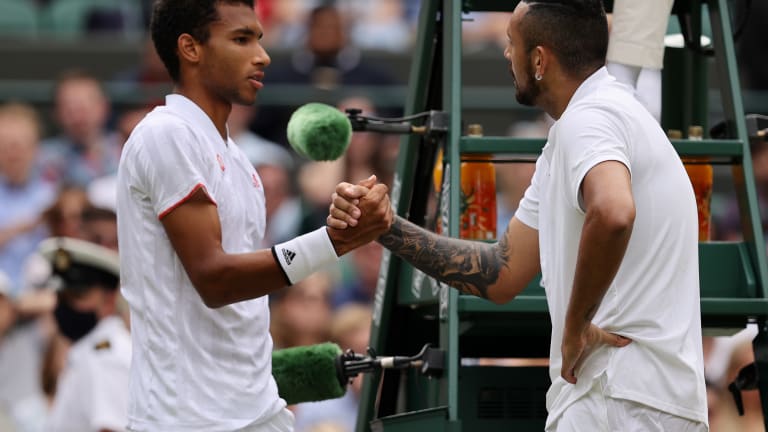In his verbal flights of fancy, Kyrgios sharply critiques tennis and romances the attraction of basketball, often citing how great it would be to part of a team sport. Is Kyrgios familiar with the great basketball coach, the late John Wooden, who led his UCLA Bruins to a record ten NCAA championships? Does Kyrgios know that one of the first things Wooden taught his players was how to put on their socks properly, lest they get blisters? One can only wonder what Wooden or Kyrgios’ theoretical teammates would have made of him showing up on Court One today having forgotten his grass-court shoes. In time, Kyrgios’ shoes were retrieved and brought to the court.
With an athlete, though, words are never more than 49 percent of the verdict. In tennis, the racquet does the majority of the talking. As today’s match got underway, Kyrgios spoke loudly. Scorching shots flew off his frame in all directions—sharp topspin backhands, penetrating backhands, big serves, liquid-smooth movement. Aiding the Kyrgios cause was that his opponent was in utter disarray, Auger-Aliassime exceptionally tight as he misfired serves, sprayed forehands galore and consistently hit the ball much shallower than you’d expect to see from a pro. Rarely did one of his shots come closer to the baseline than the service line, a lack of depth that of course made it that much easier to Kyrgios to dominate one rally after another.
With a two-break lead at 4-1, 15-love, Kyrgios felt a strain in his left abdomen. At 5-2, Kyrgios summoned the trainer for treatment. Auger-Aliassime remained off-balance, uncertain about the extent of the injury and if the result would be an addled opponent or that Kyrgios specialty, random choices that often generate untouchable placements.
But as the second set got underway, all had changed. Said Auger-Aliassime, “from the first point of the second set I felt normal. I felt normal again. I was ready to play. You know, I felt like I was playing the level that I have been playing, you know, the last few weeks in the second set.”
Kyrgios by this stage was clearly becoming increasingly constricted, his serve disintegrating into an all-arm delivery, his movements minimal. Down 4-1, Kyrgios summoned the trainer again, saying that he couldn’t serve faster than 110 m.p.h. Two games later, Kyrgios’ pencils were dulled, his eraser ready to rub this match off the page. “It was heartbreaking for me,” said Kygrios. “I told the crowd it was the end of the road. It was a journey. I honestly thought the way I was playing I could have done some pretty cool things this week.” He also had to withdraw from the mixed doubles and his partnership with Venus Williams.
“I honestly did all I could to prepare for Wimbledon,” said Kygrios. “I was training a little bit back home. I got here. I could have got here earlier, but I didn't want to. I didn't want to go in the bubble earlier. I didn't want to force that on my girlfriend, on my best friend, my manager, any of that. I got here, I did what I could. I battled through. My body just wasn't to where it needed to be to continue to play at this level and beat these quality players. My game's there. My game is obviously there. He's 15 in the world. I'm making the guy look pretty average in the first set, and I haven't played a tournament in six months. So my game is there. My confidence is high as ever.”
Body and game, head and heart. One can only wonder how much more prepared—and arguably, physically fit—Kyrgios would have been for Wimbledon had he played at least one tournament after the Australian Open.
Kyrgios has savored the role of class maverick, his ambition often cloaked under a veil of indifference to the sport—except for those moments when he can compete in front of many and show off his tremendous range of skills. “I really enjoyed the crowd this week,” said Kyrgios. “It felt like I was playing back home in Australia. It was even better. So it was cool.”
The Kyrgios mindset of solo preparation and performance is a radical contrast to the spirit of devotion, tenacity and collective accountability that has long defined his homeland’s tennis legacy. For all the ways Kyrgios takes tennis to task, he is a better fit for this individual sport than he’d dare admit.
